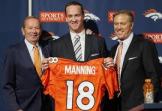Deliver on Your Word
12/11/2014 Leave a comment
Sounds simple, right? But what happens when you don’t deliver on your word. Here is a real life example that happened just a few days ago.
Throughout the year, the Big 12 has been playing the following commercial during every conference game.
The commercial brags that there will be one champion. The irony: The Big 12 had co-champions this year. The Big 12’s decision makers couldn’t decide who was better team: Baylor or TCU.
The Big 12’s indecisiveness may have caused their conference a spot in the inaugural college football playoffs. But instead of blaming the Committee in charge of the playoffs, let’s examine the actual statement from the Big 12. It’s really simple, deliver on you what you say.
Reputation and Branding
It’s a term marketers and executives use all the time, “Our Brand.” Regardless if you see branding as a strength or a bunch of malarkey, keeping your word in business is your reputation, and that is part of your brand. When you go against your word, whether intentional or not, you tarnish your brand. Once your reputation and brand are damaged, it takes time, energy and money to fix it. The bad news is that those are resources you could be using to expand your business and increase revenue. What’s even worse is that depending on how bad it is, it your reputation and brand may never be fully repaired.
Big 12 Example
 The following Monday after the Big 12 crowned their co-champions and the College Football Playoff committee named the top four, both national and local sports radio stations started attacking the Big 12. A local sports show (note that there are no Big 12 teams located near my town of Knoxville, Tennessee) spent nearly an hour dissecting the issues with the Big 12, most notably the fact that there are only 10 teams in the Big 12, which prevents them from hosting a playoff to crown a conference champion. The sports show’s co-host then went on to state how hard it will be to get to two good college sports programs to join the Big 12 due to the fact the conference is not being represented in the inaugural college football playoffs.
The following Monday after the Big 12 crowned their co-champions and the College Football Playoff committee named the top four, both national and local sports radio stations started attacking the Big 12. A local sports show (note that there are no Big 12 teams located near my town of Knoxville, Tennessee) spent nearly an hour dissecting the issues with the Big 12, most notably the fact that there are only 10 teams in the Big 12, which prevents them from hosting a playoff to crown a conference champion. The sports show’s co-host then went on to state how hard it will be to get to two good college sports programs to join the Big 12 due to the fact the conference is not being represented in the inaugural college football playoffs.
Whether this is a short-term or long-term public relations issue for the Big 12, remains to be seen. Most likely this will fade with time, but the radio host brings up a good point in that it will be hard to recruit a good team and now the Big 12 may have to lower their standards/expectations and bring on two schools that are not of the same caliber as their top performers.
Make Good on Your Word
If the Big 12 would have just picked Baylor as their Big 12 Champion, then maybe…maybe the conference would have a team in the playoffs.
Simply put, if you say you are going to do something, then do it.
But what happens if you can’t deliver on your promise?
- NO overselling: Promise on what you know you can deliver.
- Be proactive: Don’t procrastinate; start working on delivering your promise immediately.
- Make no excuses: Without compromising your morals or ethics, exhaust every option you have.
- Communicate Up Front: If you are running behind on your promise, communicate up front to see if a delay will be a deal breaker.
This all seems like common sense, but unfortunately it happens on a regular basis. What’s even worse, as customers we accept this type of service and keep giving businesses money for not delivering on their promise. Think about it: how many businesses promise you something and don’t deliver on that promise? Do they try to make up for it? If not, do you continue doing business with them?














